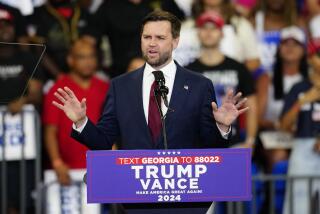The presidential name game
- Share via
I’ve long believed that the deepest divide in American society is not the lines separating genders, races and classes but, rather, the gulf between people who have normal, easily pronounceable names and those who don’t.
I’m not saying that having a name like Smith or Thompson or Hernandez is an express ticket to a carefree life. And the issue isn’t ethnicity and its attendant cultural baggage. I’m just saying that having to spell out your name to every customer service agent, doctor’s office receptionist and restaurant reservation taker you come into contact with can, depending on how many dinner reservations you make, add up to weeks or even months of your life you can never get back. And don’t get me started on the humiliation of helplessly standing by while someone else butchers your name. As someone who has picked up the phone and heard a telemarketer say “Hello, Miss Doom?” at least 500 times, I’m here to say that even short names can render the most highly trained “courtesy specialist” functionally illiterate.
Of the many drawbacks to having a weird last name, one of the more devastating is that it’s difficult to think of yourself as a potential U.S. president. If history is any indication, having a normal name is a key job requirement. Take the names of all the commanders in chief. Not a single one would have tripped up even the densest telemarketer. Crisp, phonetically logical and almost exclusively Anglican-ish -- the sole example that even hints at any kind of ethnic brio is Eisenhower, and he turns out to be standard-issue German-turned-Kansan -- the presidents’ names are familiar, straightforward and unencumbered by excessive syllables. They tend to begin and end with consonants and, based on a memorable sample -- Washington, Jefferson, Lincoln, Clinton -- that last consonant tends to be “n.”
So what does this mean for Barack Obama? Should he go searching, “Electric Company”-style, for a rogue letter “n”? Would he be better off being named Obaman? Should he go whole hog and add two consonants? (Tobaman? Nobaman?)
Look, it can’t possibly be fair to pit all those quaggy vowels (a 3-2 ratio in Obama) against the sharp contours of a name like McCain. Sure, the name McCain might sound ever so slightly like the kind of Irish pub favored by frat boys who shout 50 Cent lyrics before throwing up all over their Abercrombie sweat shirts, but it’s got to be a surer bet than a curiosity like “Obama,” right?
As it turns out, maybe not. Most of my armchair onomastic theories, which are admittedly colored by my own painful experiences with a vowel-heavy last name -- one that’s custom made for elementary schoolers (and, occasionally, readers of this column) to change to “Dumb” -- don’t necessarily hold up. Grant Smith, an English professor at Eastern Washington University (of course he’s named Smith), has done extensive research on the characteristics of presidential names. Using 20 variables, he analyzed the names of all U.S. presidents and assigned points based on their rhythmic and sonic qualities. The higher the score, the more likely they are to win elections.
Some of Smith’s findings are consistent with my own assumptions, that the soothing effect of names that juxtapose hard and soft sounds -- Truman and Reagan, for example -- have an advantage with voters over other kinds of names. But, in an interview with the Seattle Times in March, Smith said he’d also detected a public fondness for Irish names like O’Malley and O’Neill. The name Obama, he said, “grades very much like O’Donnell.”
Furthermore, according to his calculations, Obama’s name scores higher than McCain’s. (The name Clinton, perhaps not surprisingly, scores higher than Obama or McCain, but because Hillary Clinton branded herself largely by her first name, Smith factored her in as “Hillary,” which scored below McCain.)
Smith says his method is 84% accurate in predicting who we vote for in presidential elections. The last time he was wrong was when George W. Bush defeated John Kerry, whose name had scored much higher. Single-syllable names, Smith says, tend to be less favored. As for first names, he says they’re usually statistically negligible. (That must have been good news for Millard Fillmore.)
Fair enough. But as a member of the uncommon name tribe, I still find it hard to believe that American voters are capable of electing someone who’s name doesn’t sound like an industrial park. Sure, “Obama” might be one apostrophe away from something resembling an Irish name, but it so happens that no one with an “O’ ” name has ever been elected president either.
Is it too late for Obama to change his name to 50 Cent? Lots of consonants there, and musical too!
They don’t call me Miss Doom for nothing.
--
More to Read
Sign up for Essential California
The most important California stories and recommendations in your inbox every morning.
You may occasionally receive promotional content from the Los Angeles Times.














